|
|
|
Sort Order |
|
|
|
Items / Page
|
|
|
|
|
|
|
| Srl | Item |
| 1 |
ID:
086440
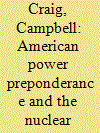

|
|
|
|
|
| Publication |
2009.
|
| Summary/Abstract |
The theory of Power Preponderance put forward by Stephen Brooks and William Wohlforth is poised to replace structural balance-of-power theory as the leading American Realist interpretation of international politics. Power Preponderance argues that would-be rivals to the US are not balancing against it because they are dissuaded from doing so by geopolitical and structural factors, rather than because they love the US or are cowed by it. This article shows why the central analytical claim of Power Preponderance would be substantially enhanced by incorporating the logic of the nuclear revolution, but that its main policy recommendation - indefinite and magnanimous American preponderance - is undermined by the spectre of nuclear war. In the nuclear age, normative solutions to the problem of anarchy invariably gravitate toward the logic of a world state.
|
|
|
|
|
|
|
|
|
|
|
|
|
|
|
|
| 2 |
ID:
185150
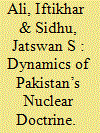

|
|
|
|
|
| Summary/Abstract |
This article seeks to discuss Pakistan’s nuclear doctrine and its significance for strategic stability in South Asia which is challenged by complex interactions between different players in political, military, and technological dynamics. In particular, India’s easy access to technology and the challenges for Pakistan associated with fears of low-intensity conflicts due to Indian offensive strategies have resulted in dangerous instabilities. The Indian technological advancement has inevitably brought revolutionary changes in the strategic thought process thus continuously forcing Pakistan to modify or upgrade its nuclear doctrine. We argue that Pakistan’s nuclear doctrine is ambiguous, and the changing contours of Pakistan’s nuclear doctrine are within the framework of how technological advancement navigates strategic stability in the South Asian region.
|
|
|
|
|
|
|
|
|
|
|
|
|
|
|
|
| 3 |
ID:
113620
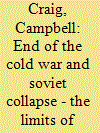

|
|
|
|
|
| Publication |
2012.
|
| Summary/Abstract |
William Wohlforth and Daniel Deudney and John Ikenberry provide strong Realist and Liberal analyses, respectively, of the End of the Cold War. Both interpretations, however, beg larger conceptual and historical questions, which cannot be answered without making the nuclear revolution central to explaining Soviet collapse.
|
|
|
|
|
|
|
|
|
|
|
|
|
|
|
|
| 4 |
ID:
171171
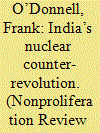

|
|
|
|
|
| Summary/Abstract |
The India–Pakistan near war of February–March 2019 highlights India’s ongoing evolution in strategic thought and practice since its emergence in 1998 as an overt nuclear-weapon possessor. These changes, involving an increasing willingness to engage in the intentional escalation of conflict with a nuclear-armed rival willing to be the first to use nuclear weapons, challenge certain academic assumptions about the behavior of nuclear-weapon states. In particular, they undermine the expectations of the nuclear-revolution theory—which anticipates nuclear and conventional restraint among nuclear-armed rivals through fear of mutual assured destruction—and the model of nuclear learning which underpins this theory, in which new nuclear-weapon states gradually absorb this restraint through policy-maker learning. This article explores how India’s learning pathway since 1998 has deviated from these expectations. India is instead pursuing its own “revolution,” in the direction of creating capabilities for flexible response and escalation dominance. It concludes by illuminating the similarities between Indian strategic behavior and contemporary practices of other nuclear-armed states, and suggests that New Delhi’s emerging de facto nuclear doctrine and posture is part of a broader empirical challenge to our current conceptions of the nuclear revolution and of nuclear learning.
|
|
|
|
|
|
|
|
|
|
|
|
|
|
|
|
| 5 |
ID:
158009
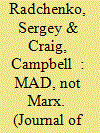

|
|
|
|
|
| Summary/Abstract |
The revival of nuclear strategy in US policy and scholarship has been strengthened by arguments that the ‘nuclear revolution’ – the assumption that thermonuclear bombs and missiles had made major war too dangerous to wage – does not affect international behaviour as much as nuclear revolution advocates claim. This article shows that the Soviet leader Nikita Khrushchev indeed regarded nuclear war as too dangerous to wage, a decision which manifested itself not so much in foreign policy or military doctrine but in his determination to avoid war when the possibility arose. We argue that Khrushchev’s experience provides us with a more useful way to characterise the nuclear revolution and suggest some implications of this argument for contemporary debates about nuclear weaponry.
|
|
|
|
|
|
|
|
|
|
|
|
|
|
|
|
| 6 |
ID:
190844
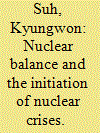

|
|
|
|
|
| Summary/Abstract |
The nuclear competition school, an emerging theoretical perspective on the political effect of nuclear weapons, argues that a favorable nuclear balance can significantly reduce one’s expected costs of nuclear war and therefore affect the interaction between nuclear-armed states, such as deterrence and crisis outcomes. This new perspective also presents a wide array of empirical evidence demonstrating the significant effect of the nuclear balance of power on political outcomes, thereby challenging the theory of the nuclear revolution, which argues that the nuclear balance of power produces no meaningful effects on political outcomes because no state can escape costly nuclear destruction. Little attention, however, has been paid to systematically exploring the effect of the nuclear balance on the initiation of nuclear crises. This is surprising, given that observable factors, such as the nuclear balance, should have a powerful effect at the crisis initiation stage because countries can observe military balance and assess the costs and benefits of entering a crisis. This article tests a core argument of the nuclear competition school regarding the effect of the nuclear balance on the initiation of nuclear crises. With original data on strategic nuclear balance, my statistical analysis shows that having a superior nuclear arsenal than another nuclear-armed opponent does not lead to a reduced likelihood of nuclear crisis initiated by the opponent. These core findings hold after conducting a series of robustness tests with various measures of the balance of nuclear forces. They encourage us to reconsider the persuasiveness of the nuclear competition school and offer implications for US nuclear policy and force size.
|
|
|
|
|
|
|
|
|
|
|
|
|
|
|
|
| 7 |
ID:
165091
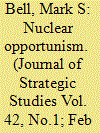

|
|
|
|
|
| Summary/Abstract |
How do states use nuclear weapons to achieve their goals in international politics? Nuclear weapons can influence state decisions about a range of strategic choices relating to military aggression, the scope of foreign policy objectives, and relations with allies. The article offers a theory to explain why emerging nuclear powers use nuclear weapons to facilitate different foreign policies: becoming more or less aggressive; providing additional support to allies or proxies, seeking independence from allies; or expanding the state’s goals in international politics. I argue that a state’s choices depend on the presence of severe territorial threats or an ongoing war, the presence of allies that provide for the state’s security, and whether the state is increasing in relative power. The conclusion discusses implications of the argument for our understanding of nuclear weapons and the history of proliferation, and nonproliferation policy today.
|
|
|
|
|
|
|
|
|
|
|
|
|
|
|
|
| 8 |
ID:
115000
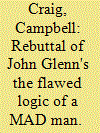

|
|
|
| 9 |
ID:
140915
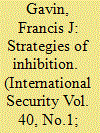

|
|
|
|
|
| Summary/Abstract |
The United States has gone to extraordinary lengths since the beginning of the nuclear age to inhibit—that is, to slow, halt, and reverse—the spread of nuclear weapons and, when unsuccessful, to mitigate the consequences. To accomplish this end, the United States has developed and implemented a wide range of tools, applied in a variety of combinations. These “strategies of inhibition” employ different policies rarely seen as connected to one another, from treaties and norms to alliances and security guarantees, to sanctions and preventive military action. The United States has applied these measures to friend and foe alike, often regardless of political orientation, economic system, or alliance status, to secure protection from nuclear attack and maintain freedom of action. Collectively, these linked strategies of inhibition have been an independent and driving feature of U.S. national security policy for more than seven decades, to an extent rarely documented or fully understood. The strategies of inhibition make sense of puzzles that neither containment nor openness strategies can explain, while providing critical insights into post–World War II history, theory, the causes of nuclear proliferation, and debates over the past, present, and future trajectory of U.S. grand strategy.
|
|
|
|
|
|
|
|
|
|
|
|
|
|
|
|
| 10 |
ID:
075485
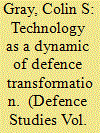

|
|
|
| 11 |
ID:
153505
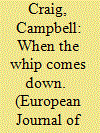

|
|
|
|
|
| Summary/Abstract |
This article examines the conflict between traditional Marxist attitudes toward war and the problem of the nuclear revolution. It shows how the advent of the nuclear revolution in the 1950s undermined traditional Marxist-Leninist concepts of war, and then goes on to argue that this development must be placed at the centre of contemporary Marxian IR if it is to have explanatory power in the twenty-first century. To make this case directly, it engages with Justin Rosenberg’s revival of Trotsky’s idea of uneven and combined development and its subsidiary law of ‘the whip of external necessity’, and argues that the whip can remain salient today only if one accepts the political utility of nuclear war. The impasse created by the nuclear revolution, it concludes, points Marxist IR in the direction of classic Marxist visions of supranationalism and human unity.
|
|
|
|
|
|
|
|
|
|
|
|
|
|
|
|
| 12 |
ID:
192530
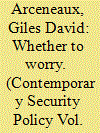

|
|
|
|
|
| Summary/Abstract |
Russia’s war in Ukraine directly speaks to a core theory in nuclear politics: the theory of the nuclear revolution. Whereas this theory argues that nuclear weapons inhibit conflict and competition in international politics, skeptics of the nuclear revolution argue that competition endures in a nuclear world, and that nuclear weapons can even enable such competition. This article argues that the Russia-Ukraine war challenges expectations of the theory of the nuclear revolution, while largely supporting arguments made by the nuclear revolution skeptics. Specifically, the article argues that the theory of the nuclear revolution cannot explain Russia’s use of nuclear threats to enable its conventional aggression, nor can it explain the ways in which Russia has developed its nuclear posture to provide a bargaining advantage in competitive risk-taking scenarios. These findings challenge the leading theory in the field of nuclear politics and yield policy implications for maintaining nuclear stability during crises.
|
|
|
|
|
|
|
|
|
|
|
|
|
|
|
|
|
|
|
|
|